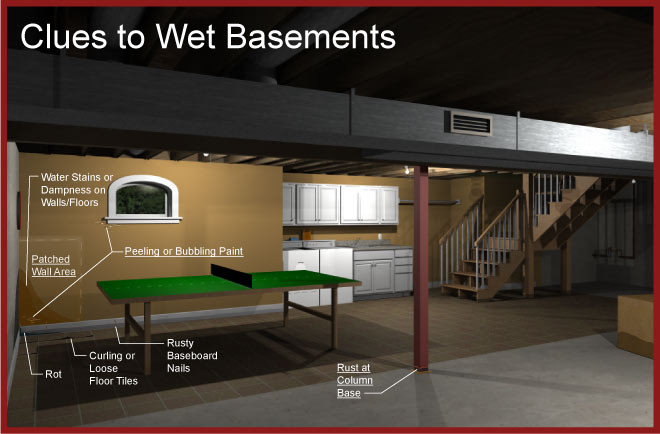Water in your basement can cause smells, mold, and even permanent damage to your home. Even if you aren’t in a flood plane there are still opportunities for water to enter your home from a excessive amount of rain, cracks in your foundation, or even burst pipes. We have put together a list of ways to help prevent water from entering your home, but it is important to know if you homeowners insurance policy will cover this type of damage if it occurs.
Ways to Keep your Basement Dry
Wet or damp basements can ruin the atmosphere of your home. Not only do they attract the ideal climate for mold, mildew, and termites, they can also have a stinky odor that is very unpleasant and difficult to get rid of. You’ll want to make sure to address the issue immediately when you first begin to see, or even smell, the problem area. Here are some solutions you can try if you have any wet or damp spots in your home:
Create a slope to keep water away from foundation- By creating a man-made slope, rainwater will travel away from home instead of towards your foundation and into your basement. Dig a 4-foot-wide trench that slopes about 6 inches away from the foundation. Next, use a layer of 6-mil poly lining to put on the dirt so any unwanted plants can’t thrive. After digging a trench and layering poly lining, cover the lining with mulch so it is still breathable for water to drain away from your home.
Invest in Gutters/Clean your Gutters- Prevent your home from creating its own moat from the roof water pouring alongside the foundation of your home. Installing gutters and downspouts will help to direct rainwater away from the foundation of your home. You must also keep them clean and free of leaves and debris to make sure water flows through them smoothly. There are certain types of gutters, such as the LeafGuard brand, that prevent clogged gutters.
Install a sump pump- Sump pumps provide many benefits to homeowners. They are used to keep basement floors dry by regulating the amount of groundwater that is underneath your house. They also prevent your basement from flooding and reduce floors from cracking or shifting from water pressure. You typically don’t need to go to this extreme unless your home is in a known floodplain or has had flooding issues in the past.
Insulate exterior basement walls- This is a great preventative measure you can take. By doing so, you will prevent condensation and also reduce your heating bill. Do not proceed with this method if the walls are already wet, since it will create a potential mold problem by trapping water within.
Insulate pipes in basement- Are your basement pipes dripping from condensation? Insulate these cold water pipes by placing foam pipe insulation over them to solve the problem. You can easily place foam insulation over pipes by cutting them with scissors to custom fit your pipes.
Run a dehumidifier in your basement- Maintaining your home at the perfect humidification level can be tricky, especially with drastic changes in weather. Dehumidifiers make it possible to take out the extra moisture in the air. It will limit the amount and growth of mold, mildew, and dust mites in your home.
Waterproofing paint like drylock- This quick fix is only if water is coming through your walls. (Do not use this method if you are experiencing floor water in your basement.) This will help as a sealant for your walls to prevent water from seeping through any cracks and holes.
Patch cracks in foundation- Patching cracks in your basement walls acts as a sealant, as well. This will prevent cracks and holes from expanding and stop water that could potentially seep through. This will not resolve your basement leaks, but it will help reduce them.
French drain- This is a large project, but well worth the price tag if you are having major flooding problems in your home. For those of you who are not familiar with a french drain, it is essentially a man-made moat around your home to fend off excess water on your foundation. This will relieve hydrostatic pressure and provide waterproofing for the exterior of your home.
Do you know if your home insurance covers flooding or water damage? We would love to assist you! Don’t hesitate to call one of our trusted Doyle & Ogden Insurance agents at 616-949-9000 or request a free home insurance quote online.

